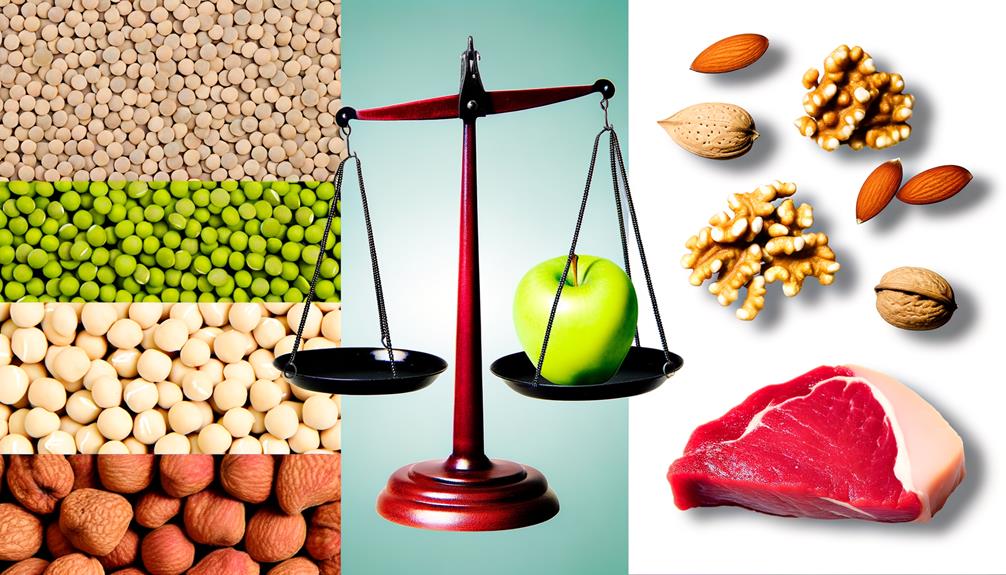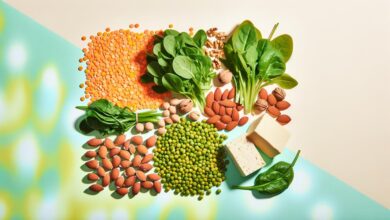Just as you’re weighing the pros and cons of your dietary choices, the debate between plant-based proteins and meat rages on, reflecting not only personal health concerns but also cultural shifts and ethical considerations. You’ve likely noticed an upsurge in plant-centric options at your local grocery store or favorite restaurant, a testament to a growing awareness that what you eat is closely connected to the well-being of the planet and its inhabitants. As you navigate through this complex terrain, you’ll find that plant-based proteins and meat differ significantly in their nutritional profiles, environmental footprints, and ethical implications. While meat has been a staple in many diets for centuries, the rise of plant-based proteins suggests a shift towards more sustainable and compassionate eating practices. In this comparison, you’ll uncover key aspects that may influence your choice, each shedding light on the broader implications of your consumption habits. What you discover may surprise you and could very well reshape your approach to nourishment and its broader impact.
Key Takeaways
- Plant-based proteins offer a complete range of amino acids, making them highly effective for human health.
- Plant-based proteins have a lower environmental impact compared to meat production, with reduced carbon emissions, water usage, and land use.
- Plant-based proteins are highly digestible and promote better health outcomes, requiring less energy to break down and reducing strain on the body.
- Plant-based proteins provide a diverse range of culinary possibilities, offering versatility in cooking and meal preparation.
Nutritional Content Analysis
When comparing plant-based proteins and meat, it’s crucial to consider that, while both offer essential nutrients, the former carries them with a lighter ecological footprint and without ethical dilemmas surrounding animal welfare. You’re not just nourishing yourself; you’re partaking in a compassionate choice that honors the planet and its inhabitants.
Plant-based proteins—like lentils, chickpeas, and quinoa—boast an impressive amino acid profile, crucial for repairing tissues and supporting metabolic functions. While it’s often mentioned that meats provide a “complete” protein, many plant-based sources, when combined, offer a full spectrum of amino acids. It’s a symphony of nutrients playing in harmony to sustain your well-being.
Moreover, the protein quality in plant-based foods is now recognized as being highly effective for human health. By opting for these foods, you’re making a conscious decision to elevate the collective consciousness, one where kindness and sustainability are as vital as the food on your plate.
Embracing a diet rich in plant-based proteins is not only a testament to your ethical values but a step towards a more equitable world. It’s a way to serve others by serving yourself nutrient-packed foods that carry a legacy of respect for all life forms.
Environmental Impact Considerations
You’ll significantly reduce your carbon footprint by choosing plant-based proteins over meat, supporting a sustainable future for our planet. The production of meat, especially beef, is resource-intensive, leading to higher greenhouse gas emissions than plant-based proteins. As someone who cares deeply about our world and the well-being of others, you have the power to make a difference through your dietary choices.
Consider the following environmental benefits of plant-based proteins:
- Lower greenhouse gas emissions: Producing plant-based proteins typically generates fewer carbon emissions than meat production.
- Reduced water usage: It takes significantly less water to grow plants for protein than to raise livestock.
- Minimized land use: More efficient land use can be achieved by cultivating protein-rich plants rather than grazing animals.
- Decreased biodiversity loss: Shifting to plant-based diets helps protect natural habitats from being converted into agricultural land for livestock.
- Less pollution: Livestock farming often contributes to soil and water pollution, whereas plant farming can be more easily managed sustainably.
Digestibility and Health Outcomes
Shifting to plant-based proteins not only honors the earth’s resources but also offers you highly digestible and health-promoting alternatives to meat. When you opt for legumes, nuts, seeds, and whole grains, you’re choosing foods with amino acid profiles that are more aligned with your body’s needs for maintenance and repair. Unlike some meats, which can be tough on your digestive system, plant proteins typically require less energy to break down and assimilate, meaning less strain on your body.
You’re not just nurturing yourself; you’re also extending compassion to other living beings and reducing your allergy potential. Plant-based diets are naturally devoid of certain allergens found in meat, making your meal choices more inclusive and sensitive to the well-being of those with dietary restrictions.
Moreover, by embracing a diet rich in plant proteins, you contribute to a collective effort of fostering a healthier society. You’re stepping away from the saturated fats and cholesterol found in meat, which are linked to various health issues, and toward a heart-friendly, fiber-rich diet. This shift can have profound implications for public health outcomes, underscoring the ethical choice that benefits both individual wellness and the greater good.
Variety and Culinary Uses
Beyond their health benefits, plant-based proteins offer a cornucopia of culinary possibilities that can invigorate your meals with new flavors and textures. Embracing a plant-based diet means exploring a vast array of foods that are not only nutritious but also kind to the planet and its inhabitants. You’ll find that the flavor profiles are as diverse as the cultures they originate from, and the preparation techniques are bound to expand your culinary repertoire.
Here’s a glimpse at the variety you can enjoy:
- Legumes and pulses transform into hearty stews or sprightly salads.
- Tofu and tempeh absorb marinades, becoming the star of your stir-fries or grills.
- Nuts and seeds add crunch to your breakfast bowls or provide a base for rich sauces.
- Whole grains like quinoa or bulgur can be pilaf powerhouses or warm, comforting porridges.
- Edible algae, like spirulina, offer an oceanic twist to your smoothies or dressings.
As you prepare meals for yourself and others, you’re not simply serving food; you’re offering an experience that respects life and celebrates diversity. Each dish is an opportunity to nourish bodies, foster compassion, and honor the earth’s bounty.
Cost and Accessibility Comparison
When comparing the costs and accessibility of plant-based proteins to those of meat, it’s essential to consider both your budget and the availability of these foods in your local market. You’ll often find that plant-based proteins like beans, lentils, and tofu are more budget-friendly than meat, especially when considering protein efficiency – the amount of protein relative to cost. This financial accessibility empowers you to make choices that align with a compassionate lifestyle without breaking the bank.
Accessibility is key, and fortunately, plant-based options are becoming more widespread even in mainstream grocery stores. This shift not only reflects a growing taste preference for plant-based alternatives but also an ethical commitment to sustainability and animal welfare. When you choose plant-based proteins, you’re not only nourishing your body but also contributing to a more equitable food system that respects our planet and its inhabitants.
Frequently Asked Questions
Can Switching to Plant-Based Protein Improve My Skin Health Compared to a Meat-Based Diet?
Switching to plant-based protein can enhance your skin’s elasticity and may lead to acne reduction, reflecting a compassionate choice that benefits both your well-being and the ethical treatment of animals.
How Does the Switch to Plant-Based Protein Affect Athletic Performance in Comparison to Consuming Meat?
Switching to plant-based protein can enhance your muscle recovery due to high-quality, ethical sources. You’ll fuel performance with compassion, serving your body and the planet with every plant-powered meal you choose.
Are There Any Cultural or Religious Considerations That Might Affect the Choice Between Plant-Based Protein and Meat?
You’ll find cultural taboos and religious fasting may sway you towards plant-based proteins, respecting ethical considerations and nurturing a compassionate lifestyle that serves others and honors diverse traditions.
Can a Plant-Based Protein Diet Provide Sufficient Nutrients for Children and Teenagers, Who Are Still Growing, Compared to a Meat-Inclusive Diet?
Yes, you can ensure children and teenagers get all essential nutrients from a plant-based diet, focusing on nutrient absorption and allergen concerns, with a compassionate approach that respects cultural sensitivities and serves the greater good.
How Does the Taste and Satisfaction Level Compare When Eating Plant-Based Protein Versus Meat, Especially for Those Accustomed to a Meat-Centric Diet?
You’ll be shocked to find that your taste buds can thrive on plant-based proteins, where flavor adaptation and texture contrast meet ethical eating, serving both your palate and the planet with every bite.







